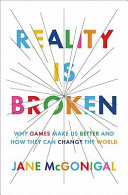Entertaining Work is a Moral Issue
I’m not the first person to notice that reality is broken compared with games, especially when it comes to giving us good, hard work. In fact, the science of happiness was first born thirty-five years ago, when an American psychologist by the name of Mihály Csíkszentmihályi observed the very same thing. In 1975, Csíkszentmihályi published a groundbreaking scientific study called Beyond Boredom and Anxiety. The focus of the study was a specific kind of happiness that Csíkszentmihályi named flow: “the satisfying, exhilarating feeling of creative accomplishment and heightened functioning.”1 He spent seven years researching this kind of intense, joyous engagement: when and where do we experience it most, and how can we create more of it?
Csíkszentmihályi (pronounced cheek-SENT-me-high) found a depressing lack of flow in everyday life, but an overwhelming abundance of it in games and gamelike activities. His favorite examples of flow-inducing activities were chess, basketball, rock climbing, and partner dancing: all challenging endeavors with a clear goal, well-established rules for action, and the potential for increased difficulty and improvement over time. Most importantly, flow activities were done for pure enjoyment rather than for status, money, or obligation.
During this kind of highly structured, self-motivated hard work, Csíkszentmihályi wrote, we regularly achieve the greatest form of happiness available to human beings: intense, optimistic engagement with the world around us. We feel fully alive, full of potential and purpose—in other words, we are completely activated as human beings.
Of course, it’s possible to achieve this kind of extreme activation outside of games. But Csíkszentmihályi’s research showed that flow was most reliably and most efficiently produced by the specific combination of self-chosen goals, personally optimized obstacles, and continuous feedback that make up the essential structure of gameplay. “Games are an obvious source of flow,” he wrote, “and play is the flow experience par excellence.”2
But if games are the most consistent and efficient source of joyous engagement in our lives, he wondered, then why did real life so infrequently resemble a game? Csíkszentmihályi argued that the failure of schools, offices, factories, and other everyday environments to provide flow was a serious moral issue, one of the most urgent problems facing humanity. Why should we needlessly spend the majority of our lives in boredom and anxiety, when games point to a clear and better alternative? “If we continue to ignore what makes us happy,” he wrote, “we shall actively help perpetuate the dehumanizing forces which are gaining momentum day by day.”
The solution seemed obvious to Csíkszentmihályi: create more happiness by structuring real work like game work. Games teach us how to create opportunities for freely chosen, challenging work that keeps us at the limits of our abilities, and those lessons can be transferred to real life. Our most pressing problems—depression, helplessness, social alienation, and the sense that nothing we do truly matters—could be effectively addressed by integrating more gameful work into our everyday lives.3 It wouldn’t be easy, he admitted. But if we failed to at least try to create more flow, we risked losing entire generations to depression and despair.
Notes:
Isn't this also a matter of perspective? Don't we need to look at life like a game?
The problem is that real-life isn't like a game. A really tough programming problem doesn't match my skills, they can go far beyond them.
Education is ENGINEERED, so it can be like a game.
Folksonomies: gamification
Taxonomies:
/health and fitness/disorders/mental disorder/panic and anxiety (0.547566)
/education/teaching and classroom resources/lesson plans (0.454132)
/health and fitness/disorders/mental disorder/depression (0.363170)
Keywords:
joyous engagement (0.913239 (positive:0.844525)), moral issue (0.897025 (positive:0.495993)), tough programming problem (0.892707 (negative:-0.648802)), human beings (0.891740 (positive:0.342154)), groundbreaking scientific study (0.868476 (positive:0.483052)), Csíkszentmihályi (0.851889 (positive:0.241815)), real life (0.839958 (negative:-0.543400)), flow experience par (0.832995 (positive:0.471565)), work (0.785268 (negative:-0.276695)), games (0.747214 (positive:0.230754)), hard work (0.728219 (negative:-0.273467)), Mihály Csíkszentmihályi (0.720329 (neutral:0.000000)), creative accomplishment (0.713481 (positive:0.715295)), American psychologist (0.708430 (neutral:0.000000)), specific kind (0.707690 (positive:0.257153)), optimistic engagement (0.706677 (positive:0.734054)), overwhelming abundance (0.704388 (positive:0.519518)), gamelike activities (0.701335 (neutral:0.000000)), purpose—in other words (0.699602 (neutral:0.000000)), happiness (0.699304 (positive:0.590148)), well-established rules (0.698507 (neutral:0.000000)), Csíkszentmihályi’s research (0.696375 (positive:0.395784)), rock climbing (0.695630 (positive:0.262859)), flow-inducing activities (0.692560 (positive:0.373795)), everyday life (0.692465 (negative:-0.414621)), greatest form (0.691845 (positive:0.683763)), favorite examples (0.691012 (positive:0.373795)), obvious source (0.689332 (negative:-0.227674)), partner dancing (0.688873 (positive:0.445856)), self-chosen goals (0.688565 (positive:0.384535))
Entities:
Mihály Csíkszentmihályi:Person (0.901136 (positive:0.347655)), chess:Sport (0.315576 (neutral:0.000000)), depression:HealthCondition (0.315503 (negative:-0.681672)), partner:JobTitle (0.304375 (positive:0.445856)), thirty-five years:Quantity (0.304375 (neutral:0.000000)), seven years:Quantity (0.304375 (neutral:0.000000))
Concepts:
Positive psychology (0.958574): dbpedia | freebase | yago
Game (0.775579): dbpedia | freebase | opencyc
Attention (0.717974): dbpedia | freebase
Philosophy of life (0.649643): dbpedia | freebase
Happiness (0.644241): dbpedia | freebase | opencyc
Apathy (0.603055): dbpedia | freebase
Force (0.522821): dbpedia | freebase | opencyc
Problem solving (0.502902): dbpedia | freebase





